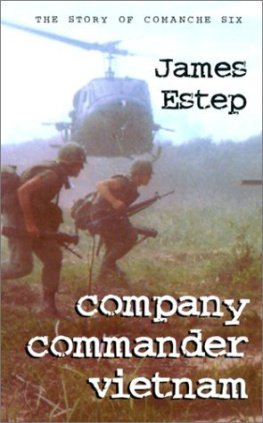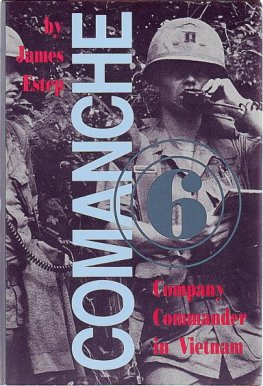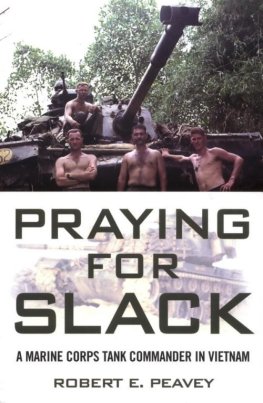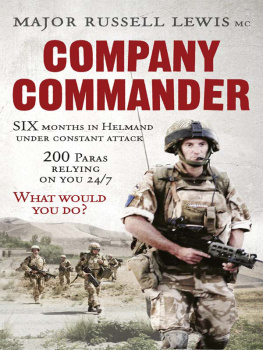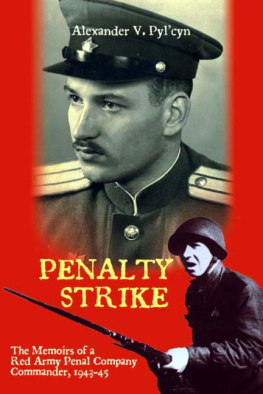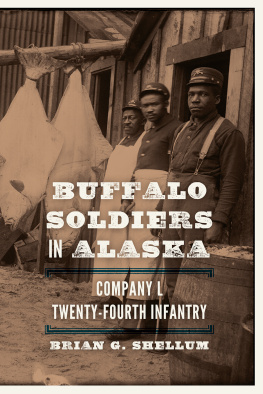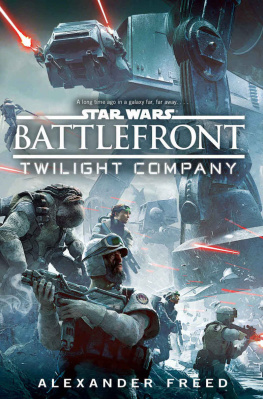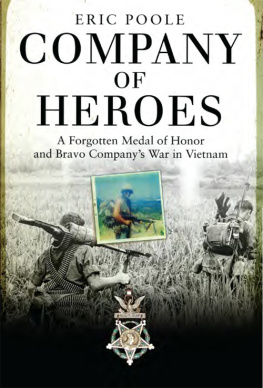James Estep - Comanche Six: Company Commander in Vietnam
Here you can read online James Estep - Comanche Six: Company Commander in Vietnam full text of the book (entire story) in english for free. Download pdf and epub, get meaning, cover and reviews about this ebook. year: 1991, publisher: Presidio Press, genre: Detective and thriller. Description of the work, (preface) as well as reviews are available. Best literature library LitArk.com created for fans of good reading and offers a wide selection of genres:
Romance novel
Science fiction
Adventure
Detective
Science
History
Home and family
Prose
Art
Politics
Computer
Non-fiction
Religion
Business
Children
Humor
Choose a favorite category and find really read worthwhile books. Enjoy immersion in the world of imagination, feel the emotions of the characters or learn something new for yourself, make an fascinating discovery.
- Book:Comanche Six: Company Commander in Vietnam
- Author:
- Publisher:Presidio Press
- Genre:
- Year:1991
- Rating:4 / 5
- Favourites:Add to favourites
- Your mark:
- 80
- 1
- 2
- 3
- 4
- 5
Comanche Six: Company Commander in Vietnam: summary, description and annotation
We offer to read an annotation, description, summary or preface (depends on what the author of the book "Comanche Six: Company Commander in Vietnam" wrote himself). If you haven't found the necessary information about the book — write in the comments, we will try to find it.
A young company commander tells what it was like to inherit an air mobile rifle company of under-achieving infantry soldiers and mold it into a successful fighting outfit in the rice paddies of enemy territory. Reprint.
**
Comanche Six: Company Commander in Vietnam — read online for free the complete book (whole text) full work
Below is the text of the book, divided by pages. System saving the place of the last page read, allows you to conveniently read the book "Comanche Six: Company Commander in Vietnam" online for free, without having to search again every time where you left off. Put a bookmark, and you can go to the page where you finished reading at any time.
Font size:
Interval:
Bookmark:
By
Presidio Press Novato, CA
Copyright 1991 by James L. Estep
All rights reserved.
No part of this book may be reproduced or utilized in any form or by any means, electronic or mechanical, including photocopying, recording or by any information storage and retrieval systems, without permission in writing from the Publisher. Inquiries should be addressed to Presidio Press, 31 Pamaron Way, Novato, CA 94949.
Typography by Prolmage Printed in the United States of America
For those who didnt return, who, like the centurions and their soldiers, deserved betterfrom the republic they served.
And especially for William Billy McCarty. He made us laugh, and we miss him.
This is a story of American soldiers who fought in a faraway place, for an elusive cause, for eleven long years.
Historians now tell us our countrys military involvement in Indochina can be chronologically divided into three distinct phases. The early 1960s was the period of the advisor, a period in which we tried to turn the tide in a relatively small insurgency, employing only a modest expenditure in men and material. This phase ended with the introduction of North Vietnams armies into the fray and the subsequent arrival of our ground forces in 1965. For the next three years, we sought to end the war by judicious use of our military might and would have probably succeeded in doing so had our national will not collapsed in the aftermath of the enemys 1968 Tet offensive. During the final and most costly phase, from the spring of 1968 until the Paris Accords were signed five years later, we simply looked for a way out.
Many fine books tell the story of Americas soldiers at war in each of these periods; however, most provide only a snapshot of our countrys exposure to this the longest of its military struggles. Having served four tours of duty in Vietnam during the years from 1962 to 1973, I had a unique opportunity to study the wars changing face as our part in it evolved from a low-level advisory effort to the massive employment of over half a million men, before once again becoming what was essentially an advisory campaign.
Moreover, my postings as a Special Forces noncommissioned and commissioned officer, a U.S. rifle company commander, and an ARVN advisor provided a dimension of diversity other than time alone from which to observe our soldiers many-faceted participation in the conflict. I hope, therefore, to have succeeded in furnishing a broader appreciation of what some of these men experienced over the wars long course, at the lowest end of combats spectrumin the paddies, the plains, and the mountains of the Nam.
Saying that, I should mention that although the book embraces four diverse tours and times, its main theme centers on service with the First Air Cavalry in 1967-68. This was the time of Gen. Vo Nguyen Giaps Tet offensive and the apex of the American infantrymans involvement in the war. In short, it was the most exciting of the tours.
Similarly, although it spans an eleven-year period, the book is by no stretch of the imagination a history of our involvement in Indochina.
This is a true story, based on my experiences as I recall them. Many of the names herein have been changed to protect the privacy of those concerned. In like manner, the books quoted passages should not be looked upon as verbatim dialogue. Much of this dialogue is fictitious.
Still, these or like conversations did take place, and the tone and tenor of what was said are as true to the spirit of those interchanges as memory will allow after a lapse of, in some cases, over twenty-five years.
Unit designations of friendly and enemy forces are, as best as retrospect and research permit, those of the actual units involved.
Infrequently, however, there are minor discrepancies in the numerical designations of supporting forces. The most glaring example of this incongruity is the multiunit Binh Loc operation described in chapter one. In this instance, to facilitate clarity and continuity throughout the book, I have intentionally identified participating adjacent units as being those that were at the time assigned to my parent headquarters in the Fifth Cavalry Regiment.
Finally, radio call signs used throughout are, with few exceptions, those that were then in effect. However, there are some instances, again in the case of supporting forces, in which call signs are fictitious.
In sum, this is the story of Americas soldiers in Vietnam. It is a story of victories and tribulations, fears and joys, laughter and tears.
If in telling it Ive offended any of those with whom I served, I apologize. Offense is certainly not my intent. You are the heroes of this work and of the nation that sent you forth to do battle on its behalf.
You are, without question, far better men than those timid souls who refused to fight in that faraway place, so long ago.
The Southern Airways Columbus-Atlanta connector departed on schedule.
Like most other uniformed passengers aboard the early morning flight, I was on my way to the pearl of the Orient Vietnam. Unlike most other uniformed passengers, I was on my way a third time.
As the two-engine turboprop gained altitude, I felt a sudden yet familiar uneasiness, an ominous fear of the unknown mingled with a fleeting longing for the security of yesterdays duties and the family that had just bid me farewell.
Why? I asked myself. Why go back again? Two times should be enough for any sane man. And dont tell yourself its because of patriotic fever, that youre once again heeding the trumpets call. Youre not.
Nor is it because Americas infantry is now in the fray and you, as a captain of infantry, should be in it with them. Thats not really it; you saw enough of that sort of thing last time around. Then why go again?
You know the answer. Its because you like it! Yes, its really that simple; you like the pace of combat, like that awareness of life that only it seems to induce. You like to feel that sudden surge of adrenaline when confronting the unexpected; you like the lack of routine, the opportunity to innovate, the hunting of animals who do indeed shoot back, the stark terror and brilliant splendor of a firefight and you like watching boys grow into men virtually overnight and in most cases being better off for having done so. You like the fear of the unknown, and for that matter you like these familiar feelings of apprehension and remorse youre now experiencing.
Its all part of it, and you like it all, dont you?
With a trace of a smile, I silently answered myself, yes, I really do.
A flight attendant interrupted these philosophical wanderings, asking if Id prefer coffee or juice before landing in Atlanta. I ordered tomato juice and then on the spur of the moment corrected myself, saying, On second thought, put a little vodka in that virgin Mary, please.
Might as well enjoy the service while it lasts; theres gonna be some long dry spells ahead.
Reclining in my seat, drink in hand, my thoughts drifted back to that first trip to the Nam. Only five years ago? It seemed like a lifetime, and yet it seemed like only yesterday, but what a difference! There were no drinks served aboard that flight. In fact, there were few seats aboard those post-World War II, double-decker C-124 Globe Masters, three of which flew us in trail from Fort Bragg, North Carolina, to Saigons Tan Son Nhut airport about as quickly as we could have swum the distance.
At the time I was a twenty-four-year-old buck sergeant in the Armys Special Forces en route to a war that had not yet become a war, or, as Sergeant Fallow was fond of saying, It may not be much of a war, Jimbo, but its the only one we got; then winking, as if sharing a secret known only amongst those of us who wore the green beret, he would always add, At least its the only one the American people know about. Which was incorrect, of course, since in 1962 the American public didnt know or care about our only war in Vietnam, much less any of the smaller covert altercations he was alluding to.
Font size:
Interval:
Bookmark:
Similar books «Comanche Six: Company Commander in Vietnam»
Look at similar books to Comanche Six: Company Commander in Vietnam. We have selected literature similar in name and meaning in the hope of providing readers with more options to find new, interesting, not yet read works.
Discussion, reviews of the book Comanche Six: Company Commander in Vietnam and just readers' own opinions. Leave your comments, write what you think about the work, its meaning or the main characters. Specify what exactly you liked and what you didn't like, and why you think so.

